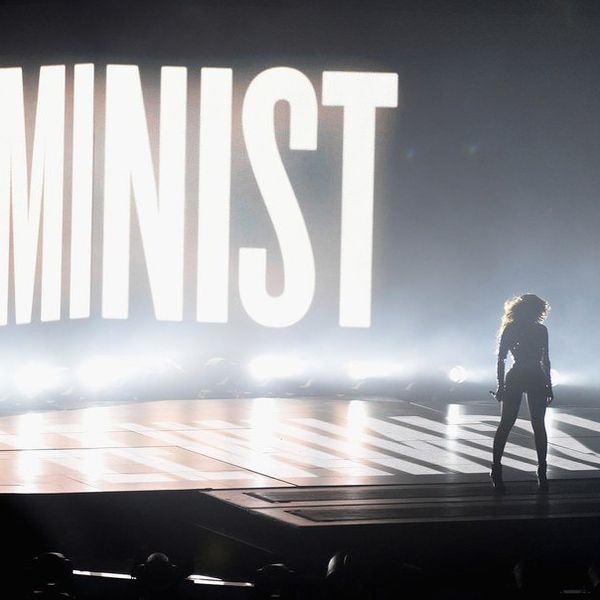As an English/secondary education major, I have had the privilege to be enrolled in an Images of Women in Literature course this semester, and it has been enlightening, informative, and refreshing. One of my favorite writers we have studied so far is Roxane Gay. She is best known for her essay turned book, "Bad Feminist."
Gay confesses, in the essay (which can be read here), that she considers herself a "bad feminist." She likes obscene and misogynistic rap music, makeup, and men. She does not live up to her own indoctrinated image of the perfect or ideal feminist, or the idea of "essential feminism," which she says:
...suggests anger, humorlessness, militancy, unwavering principles, and a prescribed set of rules for how to be a proper feminist woman, or at least a proper white, heterosexual, feminist woman—hate pornography, unilaterally decry the objectification of women, don’t cater to the male gaze, hate men, hate sex, focus on career, don’t shave.
She points out an interesting point, though; "essential feminism" caters to the "white, heterosexual, feminist woman." Maybe that's the way it used to be, but that is not the way we are headed, and it is not the way it is supposed to be. I believe in intersectional feminism which includes all sexes and genders (yes, men CAN be feminists!), races, religions, body types, socioeconomic classes, sexualities, ethnicities and any other descriptor you can imagine. The purpose of feminism is equality, and if people are excluded, that is, by definition, not equality.
Stereotypes about feminism have taught us for decades that "essential feminism" is what it's all about, and if you don't fit into the box, you must be a bad feminist. But really, feminism is about getting out of the boxes in which society has placed us.
In searching for inclusion, it is easy to see how silly the idea of "essential feminism" really is. No one person is the same. Diversity is beautiful, the spice of life, and it should be, not only acknowledged, but encouraged. No one person brings the same ideas, experiences, or interpretations of life to the table, and it is because of this we can learn so much from each other. This is also why there is room for debate and difference of opinion (that infringes on no other person's rights or causes harm) in feminism done right. Saying that someone must think like everyone else is denying them their equal right to think freely, and that is not feminism at all.
Similarly, feminism does not ask you to squash your sense of humor, become a perfect plastic figurine, give up men, and devote yourself solely to the cause. That is not only unrealistic but if we were to all become robots, feminism would be pointless. No person is perfect, thus no person could ever be the perfect feminist. Feminists are not asking you to be perfect, to stop staying at home with your children or quit your job, to throw out all of your makeup or keep your mani-pedi updated weekly, to marry or stay single. Feminism is about allowing you all of those choices (really, any choice you can imagine) to choose what is best for you. Your unique life and choices makes you important to the cause, and it's OK if they're like no one else's. Feminism wants to help create a world where every individual has the opportunity to choose any life he or she wants, and I believe in that.
True feminism is not about fitting into a stereotype, one way or the other. There is not one ideal or perfect way to be a feminist, except to include everyone as you work toward a world of justice and equality for all kinds of people. Does saying that make me a bad feminist? Well, in the words of Roxane Gay, "I would rather be a bad feminist than no feminist at all."
Can anyone truly be a "good" feminist? I'm not sure one can exist in a world of differences and imperfection. But, as Gay points out, being a bad feminist isn't a problem, until you stop trying to be a better feminist. The biggest problem with "essential feminism" is the lack of inclusion, but sometimes inclusion can take us out of our comfort zones. We must work to grow and become more inclusive. Being a better feminist is not always easy. You will be taken out of your comfort zone often.
Gay uses the example of not buying (i.e. supporting) music that degrades women. It's easy to think, "Who am I hurting as I listen to this by myself?" But it is so much more than that. If the monetary support is there, the artists will continue to make the degrading music, and the example is set that degrading women for monetary gain is OK, thus the cycle continues. But it is tough to break those habits and change even seemingly small ways of life.
True feminism, though, does not expect perfection; it expects effort toward change. Strive every day to be a better feminist, and you can enact change in yourself, in others, and in our world.
You can watch Gay's TEDTalk, "Confessions of a Bad Feminist," and hear more about what she has to say.





















